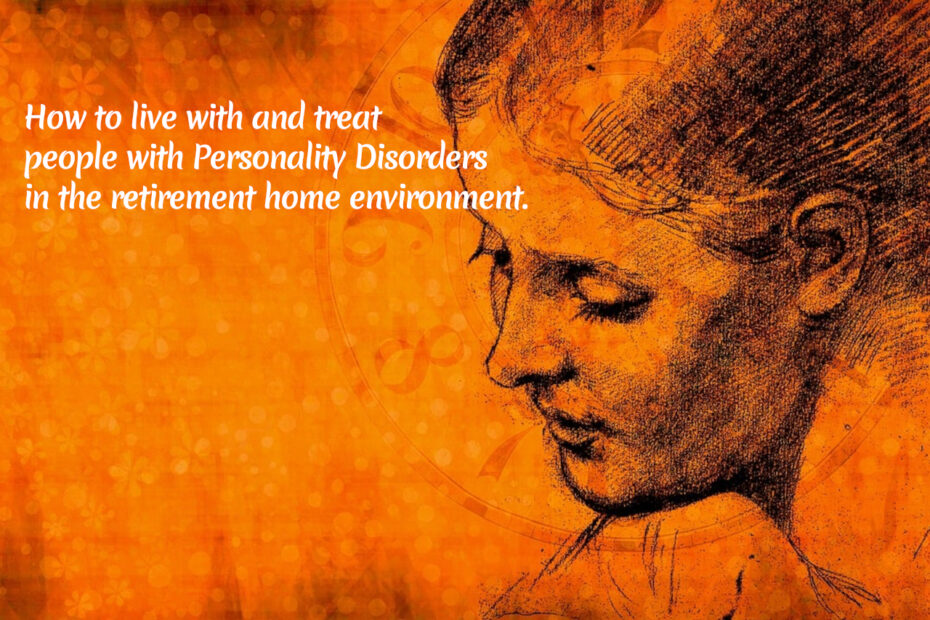Did you know that personality disorders can significantly impact the lives of many individuals?
Navigating Complex Behaviors in Senior Care
As we navigate the complexities of retirement, understanding how to live with and support those facing these challenges becomes increasingly important. Have you ever found yourself struggling to connect with a resident in a retirement home, only to discover their behaviour is influenced by underlying personality disorders?
This can be a daunting experience for families and caregivers alike.
In this blog post, we build on our previous discussions in “Dealing with Turmoil: Building Resilience for a Fulfilling Retirement” and “Finding Your Flock: Why Community Matters in Retirement,” exploring the often-overlooked impact of personality disorders in the retirement home environment.
By understanding the different types of personality disorders, you’ll gain valuable insights into potential coping mechanisms and discover how to create a more empathetic and inclusive environment. Let’s work together to enhance the quality of life for both residents and caregivers.
Narcissism and Sociopathy: Different but Overlapping
Narcissism and sociopathy are not synonymous but can overlap. They are both personality disorders, but they differ in their core characteristics. While these terms are often used interchangeably, there are distinct differences between narcissism, sociopathy, and psychopathy.
Personality Disorders
Personality disorders are enduring patterns of thinking, feeling, and behaving that deviate significantly from cultural norms. They cause distress or impairment in social, occupational, or other important areas of functioning.
Personality disorders are grouped into three clusters:
- Cluster A: Odd or eccentric behaviours (paranoid, schizoid, schizotypal)
- Cluster B: Dramatic, emotional, or erratic behaviours (borderline, narcissistic, histrionic, antisocial)
- Cluster C: Anxious or fearful behaviours (avoidant, dependent, obsessive-compulsive)
Narcissistic Personality Disorder (NPD)
Narcissistic Personality Disorder falls under Cluster B. People with NPD have an inflated sense of self-importance, a deep need for admiration, and a lack of empathy for others. They often exploit others to achieve their own ends.
Antisocial Personality Disorder (Sociopathy)
Antisocial Personality Disorder, often associated with sociopathy, also falls under Cluster B. Individuals with this disorder consistently disregard and violate the rights of others. They lack empathy and remorse, often engaging in criminal behaviour.
Psychopathy
Psychopathy is a severe form of antisocial personality disorder characterized by a pervasive pattern of disregard for others, manipulation, and a complete lack of empathy or remorse. Psychopaths often exhibit superficial charm and impulsivity.
Shared Traits:
- Lack of empathy: All three conditions involve a deficit in understanding and sharing the feelings of others.
- Manipulation: Individuals with these disorders often use manipulation as a tool to control others.
- Grandiose sense of self: While more pronounced in narcissism, elements of grandiosity can be present in the other two.
Key Differences:
- Narcissism: Primarily characterized by an inflated sense of self-importance, a deep need for admiration, and a lack of empathy. Narcissists often seek validation and approval from others.
- Sociopathy: Often associated with antisocial personality disorder, it involves a persistent pattern of disregard for and violation of the rights of others. Sociopaths may be impulsive, aggressive, and lack remorse.
- Psychopathy: A more severe form of antisocial personality disorder, characterized by a lack of empathy, remorse, and guilt. Psychopaths often exhibit manipulative behaviour, superficial charm, and a disregard for rules.
A Comparative Table
| Feature | Narcissism | Sociopathy | Psychopathy |
|---|---|---|---|
| Self-image | Inflated sense of self | Often disregard for others | Grandiose and manipulative |
| Empathy | Lacking | Lacking | Completely absent |
| Behaviour | Seeking admiration | Antisocial behaviour, impulsivity | Manipulative, predatory |
| Remorse | May experience some remorse | Limited remorse | No remorse |
It’s important to note that these are general characteristics, and individuals may exhibit a combination of traits. Additionally, these conditions are complex, and there is ongoing research to better understand them.
Severity of Personality Disorders
While the Diagnostic and Statistical Manual of Mental Disorders (DSM-5) provides specific criteria for diagnosing these conditions, the clinical presentation can vary widely from person to person.
Factors influencing the severity of a personality disorder include:
- Impairment in functioning: How significantly the disorder interferes with daily life, relationships, and work.
- Number of symptoms: The more symptoms present, the more severe the disorder tends to be.
- Severity of symptoms: The intensity and frequency of symptoms can impact overall severity.
- Comorbidity: The presence of other mental health conditions can complicate the picture and increase severity.
It’s important to note that even mild forms of personality disorders can cause distress and impairment. However, more severe cases may require intensive treatment and support.
Severity Levels for Personality Disorders
While there aren’t specific, standardized classifications for the severity of personality disorders, clinicians often use a more nuanced approach.
The severity of a personality disorder is generally determined by:
- The Global Assessment of Functioning (GAF) scale: This is a numerical scale used to assess a person’s overall psychological, social, and occupational functioning. However, the GAF has been removed from the DSM-5 due to concerns about reliability and validity.
- Clinical judgment: Mental health professionals rely on their expertise and clinical experience to evaluate the severity of a patient’s symptoms and their impact on their life.
- Dimensional approach: The DSM-5 introduced a dimensional approach to personality disorders, assessing personality traits on a continuum rather than categorical diagnoses. This allows for a more nuanced evaluation of severity.
In essence, the severity of a personality disorder is determined on a case-by-case basis, considering various factors and using clinical judgment.
Understanding the Dimensional Approach to Personality Disorders
The dimensional approach views personality disorders as extremes of normal personality traits rather than distinct categories. Instead of fitting people into rigid diagnostic boxes, it recognizes that personality traits exist on a continuum, ranging from healthy to pathological.
- Identifying Personality Traits: A clinician assesses an individual’s personality based on a wide range of traits.
- Rating Severity: Each trait is rated on a scale, indicating how extreme or problematic it is for the individual. This provides a more nuanced understanding of the person’s personality, considering the severity of each trait.
- Assessing Impairment: The impact of these personality traits on the individual’s functioning is evaluated. This helps determine if the personality traits are causing significant distress or impairment in social, occupational, or other important areas of life.
In essence, the dimensional approach provides a more comprehensive and informative picture of an individual’s personality, helping clinicians to develop tailored treatment plans.
Modern Living Flats

Basic Cottages

Modern Comfort Cottages

Comfortable Frail Care

Coping Strategies for Living with a Narcissist
Living with a narcissist can be emotionally draining and overwhelming. Here are some coping strategies to help you navigate these challenges:
Setting Boundaries and Maintaining Self-Esteem
- Identify your boundaries: Clearly define what behaviours are unacceptable to you.
- Communicate your boundaries assertively: Express your feelings and needs calmly and firmly.
- Enforce your boundaries consistently: Be prepared for resistance and be consistent in upholding your limits.
- Prioritize self-care: Engage in activities that nurture your mind, body, and soul.
- Challenge negative thoughts: Replace self-critical thoughts with positive affirmations.
- Focus on your strengths: Recognize your accomplishments and abilities.
Building a Support System
- Reach out to trusted friends and family: Share your experiences and seek emotional support.
- Join a support group: Connect with others who understand your situation.
- Spend time with supportive people: Surround yourself with positive influences.
- Limit exposure to the narcissist: Create physical and emotional distance when possible.
Seeking Professional Help
- Consider therapy: A therapist can provide guidance, coping strategies, and support.
- Seek legal advice if necessary: If you’re experiencing abuse, consult with a lawyer.
- Explore support resources: Utilize available helplines and organizations.
Remember: Your well-being is paramount. It’s essential to prioritize your mental and emotional health. By implementing these strategies and seeking support, you can regain control of your life and build resilience.
The Unique Challenges of Elderly Individuals Living with a Narcissist
Narcissistic behaviour can have a devastating impact on anyone, but for elderly individuals, the consequences can be particularly severe. The vulnerability and dependence often associated with ageing can make seniors especially susceptible to narcissistic abuse.
- Isolation and Loneliness: Narcissists often isolate their victims, and this can be particularly harmful to seniors who may have limited social circles. The lack of companionship and support can lead to feelings of depression and isolation.
- Financial Exploitation: Due to cognitive decline or trust issues, elderly individuals may be more likely to become victims of financial exploitation by narcissistic caregivers or partners.
- Emotional and Psychological Toll: Narcissistic abuse can erode self-esteem and cause significant emotional distress. For seniors, this can exacerbate existing mental health conditions or lead to new ones.
- Physical Health Decline: The stress of living with a narcissist can weaken the immune system and contribute to physical health problems. Additionally, neglect or abuse by a narcissistic caregiver can have severe physical consequences.
- Loss of Independence: Narcissists often seek to control their victims, which can lead to a loss of independence for elderly individuals. This can be particularly devastating for those who value their autonomy.
Understanding the specific challenges faced by elderly individuals living with narcissists is crucial for providing appropriate support and resources.

Dealing with Residents Exhibiting Sociopathic Tendencies in a Retirement Home
Disclaimer: This response is based on general knowledge and understanding of mental health conditions. It’s crucial to consult with mental health professionals and follow specific guidelines for your role and the facility.
Understanding the Challenges
Dealing with residents exhibiting sociopathic tendencies in a retirement home presents unique challenges. These individuals may manipulate others, lack empathy, and disregard rules. It’s essential to approach the situation with caution, empathy, and a focus on safety.
Potential Strategies to help manage residents exhibiting these behaviours.
Staff Training and Support
Effective management of residents displaying challenging behaviours necessitates well-prepared staff. Comprehensive training should equip staff with the skills to recognize, understand, and respond to difficult situations. This includes understanding sociopathic tendencies, identifying early warning signs, and mastering de-escalation techniques. Ongoing support through debriefing sessions and access to counselling services is crucial for staff well-being and effective performance. Open communication among staff is essential for sharing information, concerns, and best practices.
Clear Boundaries and Consistency
Setting clear boundaries and maintaining consistency are fundamental to managing challenging behaviour. Residents need clear expectations and consequences to understand acceptable behaviour. Staff must enforce rules fairly and consistently to deter manipulative behaviour. Power struggles should be avoided, and de-escalation techniques employed to maintain a calm and respectful environment.
Safety First
Prioritizing safety is essential. Regular safety assessments and comprehensive safety plans are crucial. Staff should be trained to recognize escalating behaviour and respond accordingly. Collaboration with security personnel can enhance safety measures.
Collaboration with Healthcare Professionals
Consulting with the resident’s physician or psychiatrist is essential for understanding the resident’s mental health condition. Regular consultations help monitor the resident’s condition and tailor interventions accordingly. Exploring medication or therapy options, in collaboration with healthcare professionals, can be beneficial. Developing individualized care plans that address the resident’s specific needs is crucial for holistic care.
Creating a Supportive Environment
Fostering a positive and supportive atmosphere for all residents is vital. Inclusive activities, open communication, and opportunities for social interaction can enhance the overall well-being of residents. Encouraging empathy and understanding among residents can contribute to a harmonious living environment.
Self-care for Staff
Staff well-being is crucial for effective care delivery. Emphasizing self-care, providing opportunities for relaxation, and offering access to support services can help prevent burnout and maintain a healthy work environment.
Remember: It’s essential to treat residents with respect and dignity, even if their behaviour is challenging. By implementing these strategies and focusing on safety and well-being, staff can create a more manageable environment for everyone involved.
Social Workers and Personality Disorders in Retirement Homes
Personality disorders can significantly impact the lives of individuals, and the retirement home setting presents unique challenges in managing these conditions. Social workers play a crucial role in supporting residents with personality disorders, collaborating with healthcare professionals, and creating a supportive environment for all.
Key roles of social workers in addressing personality disorders in retirement homes include:
- Identifying and assessing: Recognizing signs and symptoms of personality disorders in residents and conducting thorough assessments to understand their specific needs.
- Developing care plans: Collaborating with healthcare professionals to create individualized care plans that address the unique challenges posed by personality disorders.
- Managing challenging behaviours: Implementing strategies to manage challenging behaviours associated with personality disorders, such as manipulation, aggression, or social withdrawal.
- Educating staff: Providing training to staff on understanding personality disorders, effective communication techniques, and strategies for de-escalation.
- Supporting families: Offering guidance and support to families of residents with personality disorders, helping them understand the condition and providing coping strategies.
- Advocacy: Advocating for the rights and needs of residents with personality disorders, ensuring they receive appropriate care and support.
By working closely with residents, families, and healthcare professionals, social workers can help improve the quality of life for individuals with personality disorders in retirement homes.
What to Do if Targeted by Someone with a Personality Disorder in a Retirement Home
Living in a retirement home should be a peaceful and secure experience. Unfortunately, interactions with individuals who have personality disorders can disrupt this. Here are some steps you can take:
Protect Yourself First
- Document everything: Keep a detailed record of incidents, dates, times, and witnesses. This documentation can be crucial if you need to take further action.
- Set boundaries: Clearly communicate your boundaries to the individual. Be assertive but respectful.
- Limit interaction: If possible, reduce your contact with the person causing problems.
- Seek support: Talk to family, friends, or other residents about your situation. Sharing your experiences can provide emotional support and help you feel less isolated.
Involve Retirement Home Staff
- Inform staff: Report the situation to the retirement home’s management or staff. They should be aware of the problem to take appropriate measures.
- Request a transfer: If the situation is unbearable, consider requesting a transfer to a different floor or unit within the retirement home.
- Seek professional help: Encourage the retirement home to seek professional assistance for the individual with the personality disorder.
Consider Legal Action
- Consult with an attorney: If the situation involves harassment, abuse, or financial exploitation, you may want to consult with an attorney to explore legal options.
Remember: Your safety and well-being are paramount. Do not hesitate to seek help if you feel threatened or unsafe.
Evaluating a Retirement Home to Avoid Personality Disorder Issues
Choosing a retirement home is a significant decision, and ensuring a peaceful environment is paramount. Here are some key factors to consider when evaluating potential homes:
Staff Qualifications and Training
- Staff-to-resident ratio: A higher ratio generally indicates more attentive care and a better ability to manage potential issues.
- Staff training: Inquire about training in handling difficult behaviours, conflict resolution, and understanding mental health conditions.
- Staff turnover: High turnover rates might suggest underlying issues with management or resident care.
Home Policies and Procedures
- Behavioural management plans: Ask about how the facility handles disruptive or challenging residents.
- Conflict resolution procedures: Effective conflict resolution can help maintain a peaceful environment.
- Resident screening process: Understand how the facility assesses potential residents to ensure a harmonious community.
Home Environment and Culture
- Resident interactions: Observe how residents interact with each other and staff. A positive and respectful atmosphere is essential.
- Community activities: A vibrant community with various activities can foster social connections and reduce isolation, which can sometimes be a factor in disruptive behaviour.
- Visitor policies: Clear visitor policies can help maintain a peaceful environment.
References and Testimonials
- Talk to current residents: Gain firsthand insights into the community atmosphere and any challenges they’ve faced.
- Check online reviews: While not always accurate, online reviews can provide additional information about the facility’s reputation.
Additional Considerations
- Specialized care units: Some retirement homes offer specialized care units for residents with specific needs, including those with behavioural challenges.
- Emergency protocols: Understand how the facility handles emergencies related to resident behaviour.
By carefully considering these factors, you can increase your chances of finding a retirement home that promotes a peaceful and enjoyable living environment.
Conclusion
In summary, this post has explored the complexities of living with and treating individuals with personality disorders in retirement home settings.
We’ve discussed the distinct characteristics of narcissism, sociopathy, and psychopathy, and provided practical coping strategies for families and caregivers. By fostering a supportive environment and understanding the unique challenges these disorders present, we can enhance the quality of life for all residents.
Thank you for taking the time to read through this important information. For more insights and updates, be sure to follow us on social media.
Remember, “The greatest glory in living lies not in never falling, but in rising every time we fall.”
Thank you for your continued support, we appreciate your likes, follows and retweets on Facebook, Twitter, Pinterest and LinkedIn. Make sure to share this post with friends and family.
You can make a difference
With your assistance, the volunteers at La Gratitude will be able to take better care of not only the residents at the old age home but also the greater Newcastle community. La Gratitude is constantly involved in outreach projects to help the elderly in need in and around Newcastle.
Your donations will be greatly beneficial in the provision of food and other basic necessities for the less fortunate elderly people that require assistance.
Donating is easy, click here to donate now.







